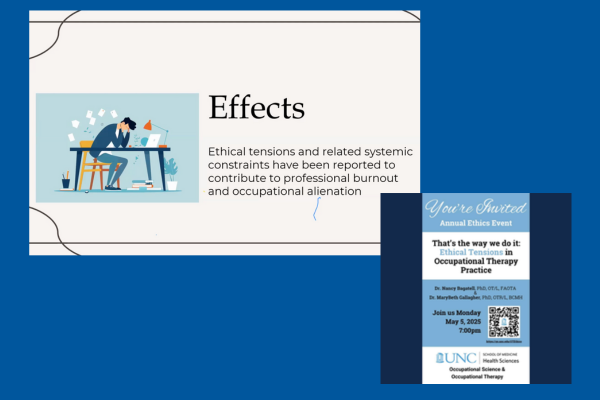Blending the Blues: Exploring Everyday Ethics in Occupational Therapy Practice

Dr. MaryBeth Gallagher, PhD, OTR/L, BCMH, assistant professor of Orthopaedic Surgery, Occupational Therapy Doctorate program, recently co-presented at UNC’s annual Ethics Event alongside Dr. Nancy Bagatell, Director of UNC’s Division of Occupational Science and Occupational Therapy. Their presentation, “That’s the Way We Do It: Ethical Tensions in Occupational Therapy Practice,” invited attendees to reimagine ethics not as a distant, procedural checklist but as a lived, daily experience deeply embedded in occupational therapy (OT) practice.

“Ethics is a foundational element of OT,” Dr. Gallagher explained, “but it can often feel abstract or disconnected from the realities of clinical work. Our goal was to re-center ethics around the real-world tensions practitioners face every day.”
The presentation drew from a Practice-Based Inquiry (PBI)—a form of action research—conducted with a Community of Practice Scholars (CoPS) in an acute mental health setting. Through reflective and iterative engagement, these occupational therapists examined their practice to become more occupation-centered.
In doing so, they uncovered systemic barriers that limited their ability to use occupation as a therapeutic tool fully. These constraints led to feelings of frustration, isolation, and a misalignment with the core values that initially drew them to the profession. Drs. Gallagher and Bagatell framed these barriers through the lens of hegemony, referencing Antonio Gramsci’s (1971) concept of dominant ideologies being accepted as “common sense” without coercion. In healthcare, this often manifests as the dominance of biomedical models that marginalize holistic, occupation-based approaches.
The presentation explored how occupational therapists experience and respond to this hegemony. Responses ranged from quietly conforming to leaving the setting in search of more supportive environments to resisting by doing what feels ethically correct, despite systemic pressures. Each of these responses, while valid, can generate further ethical tensions.
“Attendees expressed deep appreciation for the opportunity to engage in this kind of ethical reflection,” Dr. Gallagher shared. “Many said they felt validated and less alone in their struggles. We know that practicing within hegemonic systems can lead to burnout, moral distress, and poor mental health. I was grateful we could offer a space for belonging—even briefly—and help make ethics feel relevant and empowering in daily practice.”
References
- Flynn, S. (2021). Revisiting hegemony: A Gramscian analysis for contemporary social work. Irish Journal of Sociology, 29(1), 77–96.
- Gallagher, M. & Bagatell, N. (2025). Occupational therapists’ experiences of hegemony in a mental health setting: A practice-based enquiry.
- Gramsci, A. (1971). Selections from the Prison Notebooks of Antonio Gramsci. International Publishers.